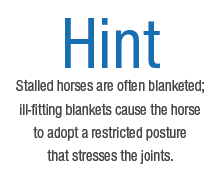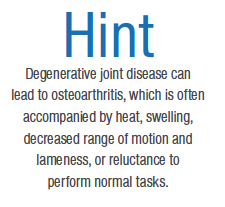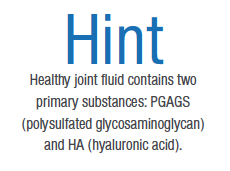We all want our horses to lead sound and healthy lives. A sound horse has balanced joints that allow for complete range of motion and optimal biomechanical function. Many riders turn to joint supplements to help achieve this goal. The problem is, there’s an incredible array of these products on the market. Are they all really worth it, and what should you be looking for?
Today’s competition horses lead lives that place repeated and unnatural stress on their joints. Simply riding in a trailer is hard on a horse’s body and many are traveling across the country on a regular basis. A horse’s environment also plays a part in joint health. Confining horses to stalls with minimal turnout is hard on them. These factors, on top of trauma from injury, old age, unbalanced shoeing or trimming, unbalanced teeth, poor conformation, asking too much of a young horse, improper saddle fit, and unbalanced nutrition all contribute to poor joint health that make joint supplements necessary.

Why joints degenerate
Most joints are enclosed by a joint capsule, which holds synovial fluid for shock absorption and lubrication. The ends of the bones are covered by cartilage, which also absorbs force and distributes the load.
Consider the left front ankle: if the hoof is out of medial-lateral balance (in other words, if the inside heel and hoof wall are higher than the outside), each step the horse takes will compress the insides of the joints all the way up his leg. Over time, the internal structures of the hoof, pastern, and ankle will become compromised. Destructive enzymes then begin attacking the cartilage and joint fluid. This can cause irreversible damage as the joint cannot repair itself. As it degenerates, the horse slowly becomes lame and uncomfortable. This is why we call it degenerative joint disease (DJD).
Choosing the right product
There are two different supplement categories for treating and preventing joint injuries – oral and injectable. The biggest difference between the two is that the injectable kind removes the digestive tract from the equation. If a horse does not have a healthy digestive system, he cannot properly utilize oral supplements.
Even with a healthy system, the oral products can be compromised by the acid in the stomach. If even 50% of the supplement gets absorbed into the bloodstream, it won’t be very effective as it gets divided and dispersed to all of the joints. Certain companies such as Rolling Meadows are specifically addressing this issue in their oral supplements. Rolling Meadows’ J2, for example, ensures optimum ingredient absorption by treating the joints as well as the digestive system. Licorice balances stomach acidity and supports the adrenals while yucca blocks the negative action of toxins released in the intestines.
 Oral supplements
Oral supplements
The goal of most joint supplements is to provide good nutrition and building blocks for healthy joints.
I like to see the following ingredients in joint supplements because they are the components responsible for maintaining joint health:
1. Glucosamine HCL is a cartilage precursor and anti-inflammatory that supports the formation and repair of cartilage. It thickens synovial fluid, providing more elasticity and support for the joints, including the vertebrae. Besides helping to form the cartilage, tendons, ligaments and synovial fluid in joints, it also aids in the formation of hooves, skin, bone, heart valves and eyes.
Many people get confused about the difference between glucosamine hydrochloride and glucosamine sulfate. They are equally effective; it just costs more to produce glucosamine sulfate. It’s made by adding either sodium or potassium sulfate to glucosamine hydrochloride.
2. Vitamin C is a powerful antioxidant that helps scavenge free radicals from around the inflamed joint, preventing “rust”. It is also excellent for supporting the soft tissues of the tendons and ligaments as well as boosting the immune system.
3. MSM is a sulfur-based building block that promotes cartilage regeneration and has anti-inflammatory properties that help decrease joint and muscle pain. I give large doses particularly right after an injury.
4. CMO, also known as Cetyl myristoleate, is a medium chained fatty acid known to decrease both inflammation and joint pain. While it is relatively new to the market, numerous scientific studies in human patients suffering from mild to moderate arthritis show consistent relief from pain and inflammation. It has also been proven to reduce swelling and joint deformation.
5. Chondroitin sulfate is a major component of the extracellular matrix and cartilage. The tightly packed and highly charged sulfate groups of chondroitin sulfate generate electrostatic repulsion that provides much of the cartilage’s resistance to compression. Like glucosamine, it is animal derived – mostly from shark cartilage and tracheas. Chondroitin sulfate is a sulfated glycosaminoglycan. This is a primary ingredient in Adequan, so is not necessary in your oral supplement if your horse gets Adequan regularly.
6. H.A., or hyaluronic acid, is the main component of joint fluid. It provides lubrication for the synovial membranes, removes waste, and nourishes the cartilage. The two oral products I have used are Haluronex and Lubrisyn, while Legend is the injectable form. I do not think it is necessary to use both; if your horse gets Legend regularly then your oral supplement need not include HA.
 Injectable support
Injectable support
Legend is HA, so it nourishes joint fluid. Adequan is PGAGS and focuses mostly on healthy cartilage but also shows some positive effects on joint fluid. Both Legend and Adequan are FDA approved for horses. The FDA approval process demands scientific evidence that a product is safe and effective before it is offered to the public. If you had to choose between the two because of budget, Adequan would be my first choice, although both can be given monthly for less than $150. Again, the benefit with injectables is that you can rest assured the product gets into the bloodstream and reaches the target area.
If there is real propensity toward DJD in a patient, I recommend both oral and injectable supplements. I use oral supplements in all my older horses and young athletes in training. I give both Adequan and Legend to my jumpers at shows because competition inevitably puts more stress on the joints. I give Adequan or injectable glucosamine to my mountain horses and mules before a long pack trip or multiple long rides in the mountains. I believe this prevents wear and tear on the joints and makes the ride more comfortable for all of us. Our older retired horses with compromised joints due to injuries get injectable glucosamine bi-monthly. And all my “in between” horses live a healthy lifestyle, have balanced mouths and feet, and are on a well balanced feed and herbal maintenance program that makes joint supplements unnecessary at this point.
What else to consider
When it comes to joint supplements, I believe you get what you pay for. The quality and quantity of ingredients can also vary from product to product. As well, not all horses respond the same way, so we routinely use applied kinesiology or “muscle testing” to determine which will best serve an individual. It also depends on the owner and the horse’s circumstances – is he uncomfortable with injections, for example, or out in a field and not receiving daily rations?
I encourage you to pick the joint supplements best suited for you and your equine partner. Remember, prevention is the best medicine! If all parts of your horse’s body are in balance, his innate intelligence will allow him to maintain wellness and balance in everything, including his joints.
Here’s a short list of joint supplements we’ve had favorable results with:
1. Silverlining Herbs – 866-543-6956 www.silverliningherbs.com
2. ABC Plus (Joint Jolt) – 800-373-5971
3. J2 – 866-289-6952 – www.rollingmeadows.com
4. Nimble – 866-233-7887 – www.adeptusnutrition.com
5. Hyaluronex – www.hyaluronex.com
6. Dynamite – 800-697-7434 www.dynamitemarketing.com
7. Myristol – 800-525-8602 – www.myristol.com
8. Platinum Performance – 800-553-2400 www.platinumperformance.com
9. Lubrisyn – 800-901-8498 – www.lubrisyn.com
Dr. Heather Mack has been practicing Holistic Veterinary medicine for 15 years. She was one of the first women admitted to Columbia University where she finished her undergraduate degree. She received her VMD at the University of Pennsylvania in 1991. She was certified by IVA S (International Veterinary Acupuncture Society) and AV CA (American Veterinary Chiropractic Association) in the early ‘90s. She maintains a very busy practice with sport horses on the west coast. When she’s not practicing, you can find her refining her riding and horsemanship skills with her horses in Idaho, or exploring the wilderness on horseback. She has devoted her life to the conscious practice of holistic horse care and medicine with animals. She is also a co-instructor of Balanced Equine Wellness.







